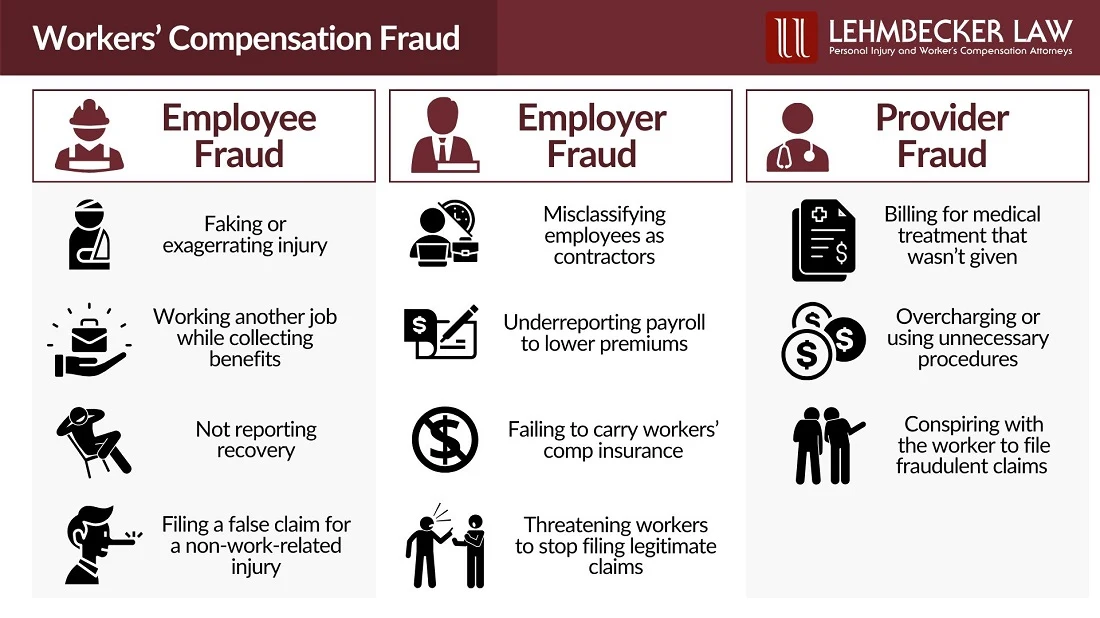There is no fee unless we win!
EN

- EN
- ES


When someone gets hurt on the job, workers’ compensation is supposed to help. It covers medical care, lost wages, and other essential support so injured workers can heal and get back to work as soon as possible. When someone takes advantage of the system, it is considered workers’ compensation fraud.
Despite the media’s best efforts to make it a big deal, it’s actually extremely rare. And, unfortunately, honest workers are sometimes caught in a system that’s quick to assume the worst. Let’s break down what constitutes workers' comp fraud, how it happens, what to look out for, and how it affects businesses and workers across Washington.
And if you're being investigated or your claim was unfairly denied under suspicion of fraud, hire our Seattle workers’ comp attorneys to help you protect your benefits.
While the term “workers’ compensation fraud” is often thrown around, it’s important to know that almost all work injury claims are entirely legitimate.
Still, the Washington State Department of Labor & Industries (L&I) investigates cases where it suspects someone may have intentionally misrepresented facts, whether it’s a worker, employer, or medical provider. They have good reasons to do this because when someone commits workers' compensation fraud, they’re not just breaking the law; they’re driving up insurance costs and damaging trust in the system.
Unfortunately, these investigations often target innocent workers and cause unnecessary delays or denials.

Workers’ comp fraud comes in several forms. Here are the most common types:
This refers to the rare instances when a worker may misrepresent the nature of an injury or continue collecting benefits after recovery. However, studies show these cases are a small minority — less than 2% of workers’ comp claims involve fraud.
Examples include:
What’s more concerning is how quickly some insurers or employers use the term “fraud” to question legitimate injuries, putting workers on the defensive without due process.
Some employers commit workers' comp fraud to avoid high insurance premiums. In fact, employer fraud is far more common and costly to the system.
This can include:
Unfortunately, these practices often lead to denied or underpaid claims for employees who were hurt through no fault of their own.
Though rare, even doctors and clinics sometimes get caught.
How it happens:
Make no mistake: committing workers' compensation fraud is a serious crime. Washington State takes this issue seriously, and the penalties can be severe if you're caught.
Potential consequences include:
Remember that these penalties apply only if someone is found guilty of intentional fraud. If you’re under investigation but did nothing wrong, don’t panic. Legal representation can help you clarify the facts and avoid being punished for a misunderstanding.

If you believe a claim or denial may involve fraud, especially from an employer misclassifying your role or denying coverage, you can report the issue to the Washington State Department of Labor & Industries (L&I).
When submitting a report, include as much specific information as possible, such as:
Once submitted, L&I will investigate and determine whether fraud occurred. You don’t need to take any further action unless they request additional information.
Yes, you can report anonymously to the National Insurance Crime Bureau (NICB) if you prefer. They operate a confidential tip line (800) 835-6422 for all types of insurance fraud, including workers’ compensation. You can also leave an anonymous report online on the NICB website (leaving contact details is optional).
In Washington, workers’ comp fraud investigations typically take several weeks to a few months, but some may take longer if the case requires surveillance, interviews, or legal action.
If L&I needs additional documentation or witness statements, the timeline can be extended. However, in more straightforward cases — such as when there’s clear evidence of false claims — the process may move faster.
Once the investigation is complete, L&I will determine whether fraud occurred and what actions to take, including penalties, repayment demands, or even criminal charges.
This isn’t just about a few dishonest employees or shady employers.
Fraud in the system hurts everyone:
The most significant harm isn't just the small number of fraudulent claims — it’s the growing mistrust that causes honest workers to be scrutinized unfairly. Overly aggressive fraud investigations can delay legitimate claims, pressure injured employees to return to work too soon, or discourage people from filing altogether.
Unfortunately, not all employers play fair. Some may try to avoid responsibility by misclassifying employees, downplaying the severity of your injury, or even accusing you of workers’ compensation fraud to avoid a payout. If this happens to you, don’t face it alone — hire a trusted Washington workers' comp attorney from Lehmbecker Law.
We’ve seen how tough it can be for injured workers to get the wage and medical benefits they rightfully deserve. Our team understands Washington’s workers’ compensation laws, and we know how to push back when an insurance company or employer tries to deny, delay, or devalue your claim.
Contact us today, and let’s get you the support you need to heal and move forward.

We know how devastating it is to be accused of something you didn’t do, especially when you're recovering from an actual injury. Let us review your case and explain your options.
A mistake is accidental, like a paperwork error. Fraud involves intentional deception to receive benefits or avoid paying what’s owed.
No. As long as your report is made in good faith, you’re protected from retaliation, and your name can remain confidential.
They could face severe fines, lawsuits, and even criminal charges, especially if an injury occurs on the job.
Watch for excessive or unnecessary treatments, inflated billing, or inconsistent records. If it doesn’t feel right, get a second opinion or report it.
Yes — and you absolutely should contact us. Being accused doesn’t mean you're guilty. Our attorneys can help clarify the facts, protect your record, and push back against wrongful investigations.